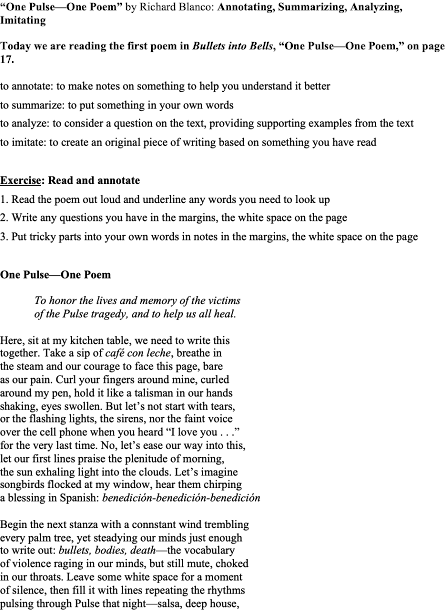Week 101: College Reading and Writing: Rita Dove and Marie Delus
Week 101:
College Reading and Writing
Rita Dove and
Marie Delus: Annotating, Summarizing, Analyzing, Imitating
to annotate: to make notes on something to help you understand it
better
to summarize: to put something in your own words
to analyze: to consider a question on the text, providing
supporting examples from the text
to imitate: to create an original piece of writing based on
something you have read
We are doing the fourteenth poem and response in our book today,
starting on page 46.
Exercise: Read and Annotate
1.
Read the poem and response
out loud and underline any words you need to look up.
2.
Write any questions you
have in the margins or in your notebook.
3.
Put tricky parts into your
own words in notes in the margins or in your notebook.
Exercise: Respond to Poem
Write a
response to this poem. What are your first impressions? How do you connect or
disconnect to the subject and speaker? Does the poem remind you of anything
from your own life and experience?
Exercise:
Questions for Comprehension of the Poem
1.
What is the effect of point of view
shift in the poem?
2.
What does Dove mean by “especially when
you know it isn’t” (Dove 46)?
3.
What is the significance of the section
titles? What would change if they weren’t there?
4.
What is the significance of the shift
in diction in the last stanza?
Exercise:
Questions for Comprehension of the Response
1.
What is the joy describing
in the first paragraph?
2.
What is the guilt
describing in the second paragraph?
3.
What does Deluth mean by
“we have another battle entirely on our hands” (Delus 49)?
Homework Assignment: Summarize the Poem
Write a
7-9 sentence paragraph summarizing the poem with quotations, in-text citation,
and a Work Cited Page.
Example Summary: Too short, but incorporates quotation and
in-text citation:
Rita Dove’s poem “Meditation at Fifty Yards, Moving Target” is
broken up into four sections, spanning from safety procedures, like “assume a
loaded barrel” (Dove 46), through the differences in gun preferences between
men and women, where “guys like noise” and women “prefer precision” (Dove 47).
The last stanza personifies a bullet, giving it a desire in the line “beautiful
body i am coming i am yours” (Dove 48)
Work Cited Page
(for today’s poem)
Dove, Rita. “Meditation at
Fifty Yards, Moving Target” Bullets Into Bells: Poets and Citizens Respond
to Gun Violence. Ed. Brian Clements et al. Beacon Press, 2017.
Homework Assignment: Summarize the Response
Write a 7-9
sentence paragraph summarizing the response with quotations, in-text citations,
and a Work Cited Page.
Homework
Assignment: Analysis
Question for analysis: How does the joy and guilt that Delus
speaks of in her response connect to the poem? Where does the power and
accomplishment that Delus speaks of fit in? Use quotation and in-text citation
to support your answer.
Homework
Assignment: Imitation
Write your own poem giving instructions on how
to perform a task. Make the last stanza from the perspective of the object.
Homework:
- Summary of Poem
- Summary of
Response
- Analysis of
Poem/Response
- Imitation of
Poem
About
this class:
In this class, you are welcome to submit
homework for a grade. If it’s not strong
enough to earn an A, I’ll give you some comments to help you revise it, and let
you do it over again. You have as many chances as you want to complete and
perfect the work in this class, and you are welcome to do more than one week’s
worksheet for homework at a time; ask me for sheets you’ve missed. Students who complete 15 weeks of graded
assignments and a longer paper can qualify for college credit. When you get close to completing 15 weeks,
I’ll help you get started on your longer paper.


Comments
Post a Comment